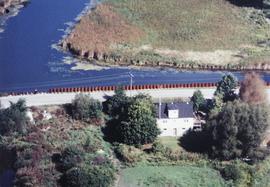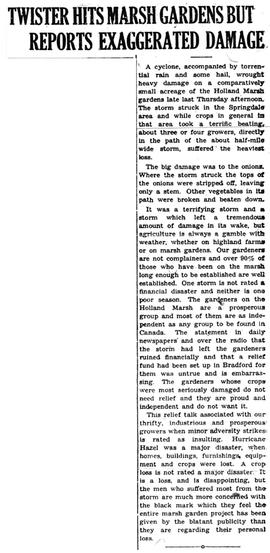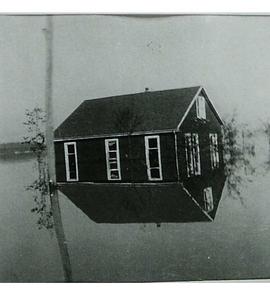Tom Fuller Remembers Working on Marsh with Professor Day
- CA BWGPL LHC-Her-Day-PH25583
- Item
- 1986-09-17
Part of Local History Collection
Description : Tom Fuller Remembers Working on Marsh with Professor Day
Tom Fuller is one of many long-time Bradford residents who has a wealth of information about the town and surrounding area's past, as well a as few good anecdotes.
This article is the first of what is hoped to be many featuring some of our long time residents wo have a good story to tell.
Mr. Fuller was one of the early workers on the Holland Marsh. He knew and worked for, and later alongside Professor William Day, who is generally credited with "creating" the rich farmland of the area.
When Professor Day died in his fields on July 5, 1938, Mr. Fuller was nearby. He served as pall bearer at both Professor Day's and his wife Ethel (Williams') funerals.
The first job Mr. Fuller has in the marsh was in 1927 as a diver, swimming down under the dredges that had been used to construct the canals. His job was to undo bolts, in order to dismantle them.
"I'd dive down, take the wooden deck plates off, come up and have a cigarette, and go back down again," Mr. Fuller said, in an interview at his home in town.
He got the job because he knew how to swim. He had arrived from Australia on "Friday, the 23rd of May," he says, and he needed a job.
He was 19 at the time, having arrived in Australia three years earlier from his birthplace of London, England.
He left for Canada with friends, and ended up in Bradford because his older brother Bill lived in town.
At that time, the canals that outline the farming area had been dug, and all that was left was to build a dam to link the two, he says.
"They buried old car bodies by the dozens to get a footing, then planting willows to anchor it," Mr. Fuller says. "That's when I met (Professor Day) and found out he'd planned and supervised the draining of about 10,000 acres."
Mr. Fuller remembers how the marsh came to be drained and eventually became one of the richest agricultural areas in the province. He doesn't think enough people remember Professor Day's part in making a dream he and few other shared, become a reality.
While there had been plans as early as the late 1800's to drain the area to use the peat for fuel, it was not until about 1910 that a Bradford grocer, David Watson, approached Professor Day at the agricultural college in Guelph.
The professor tested the muck soil and decided it was ideal for vegetables.
At the time, hay was harvested from the area to make mattresses.
Horses were used to cut down the hay, and Mr. Fuller says they were equipped with wooden "shoes," so they wouldn't sink too far down into the mucky soil.
Professor Day developed a syndicate that purchased 4000 acres by 1912. But the draining of the area was delayed by the war and depression.
After many submissions to the local councils in Bradford, King and West Gwillimbury, provision was made for the draining in the Municipal Drainage Act of 1924.
In that year, Professor Day resigned his position as head of the agricultural and engineering departments at the Guelph college, and moved to Bradford.
"He gets 100 per cent credit," Mr. Fuller says. "Many farmers here had useless land but when it was drained, it became valuable."
But it was to be many years yet before the marsh was to produce at its potential.
Mr. Fuller worked on the finishing portions of the drainage, and for a few years left the marsh to work at the Toronto Furniture Company on Holland Street East, next to Spence's Mill.
"We made reed and fibre furniture - summer furniture," he says.
When the depression hit in 1929, Mr. Fuller went back to Professor Day for a job.
"He had the land going by then," Mr. Fuller says. "The wages were good, 20 cents an hour. I worked that year cleaning up the crop." Professor Day owned a large portion of the land at that point, Mr. Fuller says.
"But it didn't do him any good because of the depression. You couldn't sell anything. They were really hard times. Married men worked for 17 cents an hour, single for 15 cents...I got a raise as foreman the next year and got 20 cents."
Most of the crops were lettuce and celery, and those were considered luxury items during the depression, Mr. Fuller said.
A lot of other men who worked in the marsh still live in the area, he says, and as he starts to name them off, he says he'd better not forget anyone, or he'll hear about it.
"Harold Taylor still lives in town, and Homer Henbest. His father was principal of the school at Amsterdam."
Amsterdam was a community between Bradford and Holland Landing, Mr. Fuller explains.
"Harold's mother was a teacher there, and his dather was a minister."
Other names Mr. Fuller remembers from the early 30's on the marsh included Wilbert Mullus, Herb Taylor, Bob Edney, Bill Semenuck, Frank Marino and Gordon McKelvie.
"I musn't forget any, they'll never forgive me," Mr. Fuller said.
There were also many families from Holland Landing -- the Fosters, Ellis', Wests, Landridges, Thompsons and Bekes, who were from Amsterdam.
"I worked for Mr. Day from 1930 till 1938, when he lost his land. He lost everything," he says.
"You have to keep in mind the great depression. We had thousands of crates of celery and lettuce. They were considered luxury foods which no one could afford.
Although Professor Day, along with many others, recognized the potential of the marsh, it was never really successful because of the depression, legal entanglements, and the Canadian farmers who weren't used to farming the muck soil.
While Tom Fuller Remembers 1930 as the year Professor Day visited the Dutch embassy in Toronto, other reports state the Dutch ambassador, John Snor, visited the area and decided farmers from the Netherlands would be ideally suited for the land.
Fourteen families that had settled in the Hamilton-Burlington area were convinced to come to the marsh, and settle in the southeastern portion. They were helped out by a three-way loan of $600 split evenly between the three levels of government.
When the three municipalities involved couldn't come up with their portion, Mr. Snor obtained the money from his government.
The first small settlement on the marsh was named in honor of Mr. Snor and his daughter Anne. The Dutch heritage of the hamlet of Ansnorveldt is still felt in the community just south of Bradford.
The first two years, 1934 and 1935, were not very successful, but by the next year, farms were flourishing.
Professor Day, "saw the marsh become successful," Mr. Fuller says.
"He talked to himself quite a bit...I remember his looking out and saying he wished his father could see him now, how successful he was."
The professor was speaking of the success of the farms, not his own financial success, Mr. Fuller said.
"He never cared about making money."
The marsh never really took of financially until halfway through the war, Mr. Fuller says. The government needed crops for the troops in camps all over Canada, and many of the vegetables were purchased from the marsh farmers.
Before that Professor Day had lost much of his land because he couldn't sell his crops. But he kept a small parcel, and called his farm KingGwillimBradGardens.
It was on his farm on lot 8, as Mr. Fuller describes it, that Professor Day suffered a heart attack.
"I was on my own lot, number 5, and he was on lot 8, I saw Bill (Day) go roaring out saying something was wrong."
"It was mid summer, a hot day. He had a heart attack right in his celery field."
Mr. Fuller continued farming for a few years after Professor Day's death, and decided h was going to expand his small roadside vegetable stand into the largest on the highway.
It was not to happen though. While at his friend Ron Bedford's cottage on the Severn River one day in the spring, he heard the news the Germany had invaded France.
"I'd been listening to that, and watching the trains go by taking the first divisions to fight."
"I told my wife one day I was going to Barrie and when she asked why, I said because I had joined the army."
Mr. Fuller fought in France, Holland, Germany and Belgium.
"I was taken prisoner in the last month," he says. "On the 10th of April we were out in Germany between Bremen and Hamburg."
His brother has taken over the farm, and when he got back to Canada, Mr. Fuller was determined to get back on the land.
He knew his land on the edge of the marsh had been farmed for enough years that it wasn't as productive as it could be. He wanted to get more toward the centre of the marsh, where he says the land is better.
He got his land, and made a living selling his produce from his oldest son George's truck, which they drove throughout the area - Queensville, Keswick, Jackson's Point, Sutton are the places he mentions.
With the money he made, he was able in 1958 to pay off the mortgage on the home he bought through the Veteran's Land Act in 1946.
He still lives with his wife Ethel in the home at the corner of Colborne and John Streets.
"This house was built in 1945," and was at the limits of the town then, he says.
"The fence at the back is from the 1800's. North was the Stoddart farm."
"There are boards in this house from the old Good's Elevator," that was built in the mid 1800's near where the GO train station is now, he says.
"It was pulled down in 43 or 44. Don (Collings who built the house) knew where to get good wood."
When he "retired" from farming, he worked for eight years at the Federal Farms chip plant.
"Do you remember Mad Hatter chips? I cooked Mad Hatter chips and cheesies."
After he "retired" from that job in 1965, he went to work in the town liquor store, where he had worked in the farming off-seasons in the past.
After four years in the liquor store, he finally settled on a real retirement.
The spry 78-year-old is kept busy around town and in his large backyard garden. He does the shopping because his wife is mostly confined to home with arthritis.
"I do everything," he says. "Unless I get a chance to go fishing, and if I get a chance, well that takes precedence over everything."



